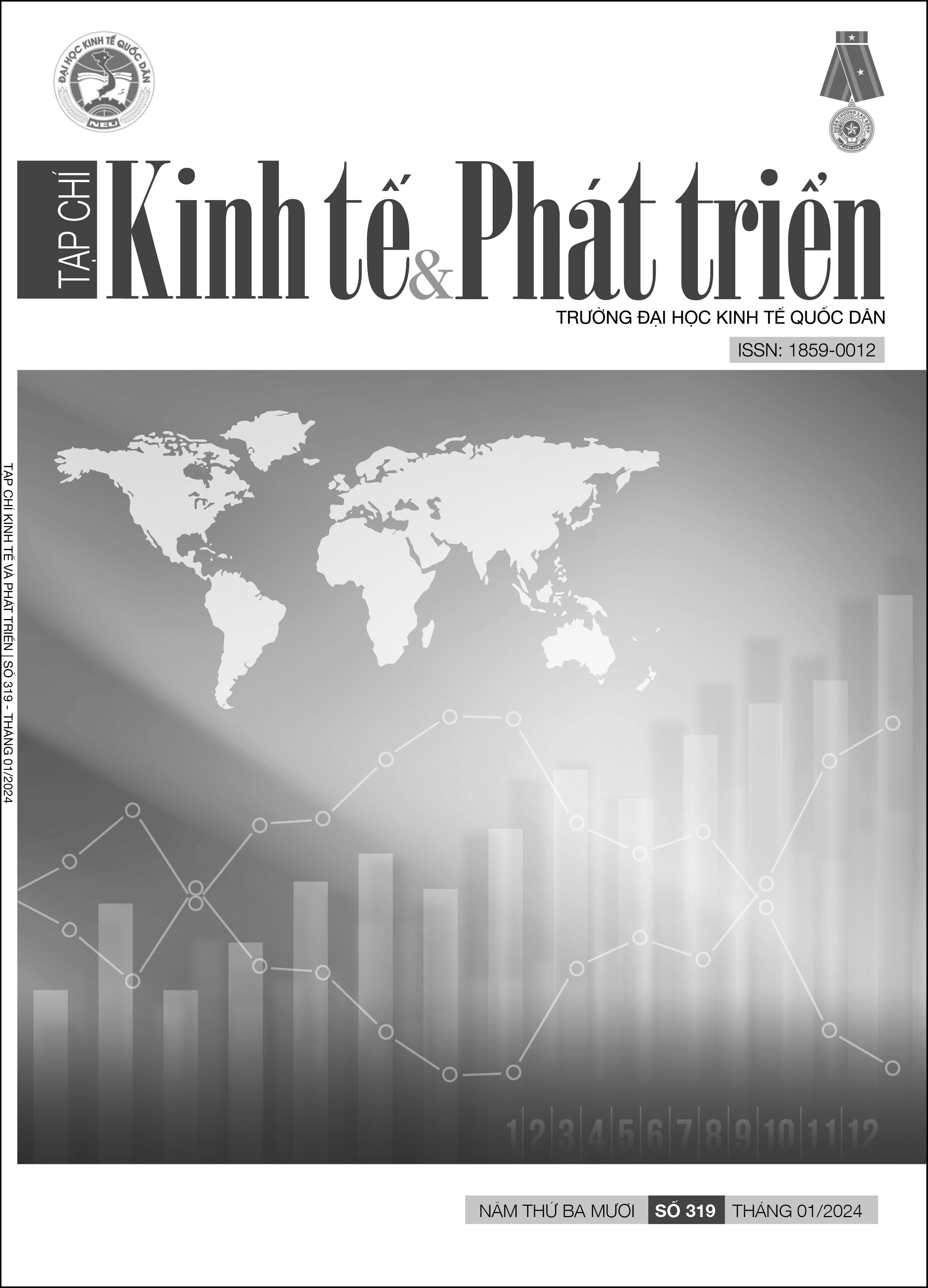Ảnh hưởng của giá trị sang trọng đến sẵn lòng chi trả và truyền miệng đối với khách sạn hạng sang: Vai trò của sự hài lòng
DOI:
https://doi.org/10.33301/JED.VI.1294Từ khóa:
giá trị sang trọng, giá trị độc nhất, giá trị tiêu khiển, và giá trị địa vị, hài lòng, sự sẵn lòng chi trả, truyền miệngTóm tắt
Nghiên cứu này tập trung vào giá trị sang trọng của khách sạn hạng sang và khám phá mối quan hệ giữa biến số này với sự sẵn lòng chi trả và truyền miệng của người tiêu dùng với hài lòng là biến số kết nối. Kỹ thuật mô hình cấu trúc bình phương bé nhất bán phần (PLS-SEM) áp dụng trên một mẫu 300 người tiêu dùng cho thấy tác động của giá trị sang trọng, gồm giá trị độc nhất, giá trị tiêu khiển, và giá trị địa vị, đến hài lòng, và hài lòng tác động đến sự sẵn lòng chi trả và truyền miệng. Về mặt lý thuyết, nghiên cứu gia tăng sự hiểu biết về vai trò của giá trị sang trọng đối với sự sẵn lòng chi trả và truyền miệng tích cực thông qua việc gia tăng sự hài lòng. Về mặt thực tiễn, nghiên cứu nhấn mạnh tầm quan trọng của giá trị hạng sang như là một chiến lược thương hiệu mà nhà quản trị cần quan tâm để duy trì lợi thế cạnh tranh.
Tài liệu tham khảo
Ahn, J., Hyun, H., & Kwon, J. (2021), 'Perceived benefits and willingness to pay premium for luxury experiences: exploring perceived authenticity as a mediator.' Tourism Recreation Research, 1-9. doi:10.1080/02508281.2021.1877433
Casidy, R., & Wymer, W. (2016), 'A risk worth taking: Perceived risk as moderator of satisfaction, loyalty, and willingness-to-pay premium price.' Journal of Retailing and Consumer Services, 32, 189-197.
Chen, A., & Peng, N. (2014), 'Examining Chinese consumers’ luxury hotel staying behavior.' International Journal of Hospitality Management, 39, 53-56.
Choi, H., & Kandampully, J. (2019), 'The effect of atmosphere on customer engagement in upscale hotels: an application of S-O-R paradigm.' International Journal of Hospitality Management, 77(January), 40-50.
Fornell, C., Rust, R. T., & Dekimpe, M. G. (2010), 'The effect of customer satisfaction on consumer spending growth.' Journal of Marketing Research, 47(1), 28-35.
Hair, J. F., Hult, G. T. M., Ringle, C., & Sarstedt, M. (2016). A primer on partial least squares structural equation modeling (PLS-SEM). Thousand Oaks, CA: Sage Publications.
Hwang, J., Choe, J. Y., Kim, H. M., & Kim, J. J. (2021), 'Human baristas and robot baristas: How does brand experience affect brand satisfaction, brand attitude, brand attachment, and brand loyalty?' International Journal of Hospitality Management, 99. doi:10.1016/j.ijhm.2021.103050
Hwang, J., & Hyun, S. S. (2015), 'Perceived firm innovativeness in cruise travelers’ experience and perceived luxury value: The moderating effect of advertising effectiveness.' Asia Pacific Journal of Tourism Research, 21, 101-128.
Kang, J. (2018), 'Finding desirable post-consumption behaviors: An investigation of luxury value and romantic brand love relationships.' International Journal of Contemporary Hospitality Management, 30(9), 2984-3003.
Khoi, N. H., & Le, A. N.-H. (2022), 'Is coolness important to luxury hotel brand management? The linking and moderating mechanisms between coolness and customer brand engagement.' International Journal of Contemporary Hospitality Management, 34(7), 2425-2449.
Khoi, N. H., Tuu, H. H., & Olsen, S. O. (2018), 'The role of perceived values in explaining Vietnamese consumers’ attitude and intention to adopt mobile commerce.' Asia Pacific Journal of Marketing and Logistics, 30(4), 1112-1134.
Kumar, V., Rajan, B., Gupta, S., & Pozza, I. D. (2019), 'Customer engagement in service.' Journal of the Academy of Marketing Science, 47(1), 138-160.
Le, A. N. H., Khoi, N. H., & Nguyen, D. P. (2021), 'Unraveling the dynamic and contingency mechanism between service experience and customer engagement with luxury hotel brands.' International Journal of Hospitality Management, 99(October). doi:10.1016/j.ijhm.2021.103057
Masiero, L., Yoonjoung Heo, C., & Pan, B. (2015), 'Determining guests’ willingness to pay for hotel room attributes with a discrete choice model.' International Journal of Hospitality Management, 49, 117-124.
Oliver, R. L. (1997). Satisfaction: A behavioral perspective on the consumer. New York: Routledge.
Pansari, A., & Kumar, V. (2016), 'Customer engagement: the construct, antecedents, and consequences.' Journal of the Academy of Marketing Science, 45(3), 294-311.
Peng, N., & Chen, A. (2019), 'Examining consumers’ luxury hotel stay repurchase intentions-incorporating a luxury hotel brand attachment variable into a luxury consumption value model.' International Journal of Contemporary Hospitality Management, 31(3), 1348-1366.
Rather, R. A., & Hollebeek, L. D. (2019), 'Exploring and validating social identification and social exchange-based drivers of hospitality customer loyalty.' International Journal of Contemporary Hospitality Management, 31(3), 1432-1451.
Stokburger-Sauer, N. E., & Teichmann, K. (2013), 'Is luxury just a female thing? The role of gender in luxury brand consumption.' Journal of Business Research, 66(7), 889-896.
Sweeney, J. C., & Soutar, G. N. (2001), 'Consumer perceived value: the development of a multiple item scale.' Journal of Retailing, 77(2), 203-220.
Tian, K. T., Bearden, W. O., & Hunter, G. L. (2001), 'Consumers' need for uniqueness: Scale development and validation.' Journal of Consumer Research, 28(1), 50-66.
Vigneron, F., & Johnson, L. W. (2004), 'Measuring perceptions of brand luxury.' Journal of Brand Management, 11(6), 484-506.
Warren, C., Batra, R., Loureiro, S. M. C., & Bagozzi, R. P. (2019), 'Brand coolness.' Journal of Marketing, 83(5), 36-56.
Wiedmann, K.-P., Hennigs, N., & Siebels, A. (2009), 'Value‐based segmentation of luxury consumption behavior.' Psychology and Marketing, 26(7), 625-651.
Wu, B., & Yang, W. (2018), 'What do Chinese consumers want? A value framework for luxury hotels in China.' International Journal of Contemporary Hospitality Management, 30(4), 2037-2055.
Yang, F. X., & Lau, V. M. C. (2015), '“LuXurY” hotel loyalty – a comparison of Chinese Gen X and Y tourists to Macau.' International Journal of Contemporary Hospitality Management, 27(7), 1685-1706.
Yang, W., & Mattila, A. S. (2016), 'Why do we buy luxury experiences?' International Journal of Contemporary Hospitality Management, 28(9), 1848-1867.
Zeithaml, V. A. (1988), 'Consumer perceptions of price, quality, and value: a means-end model and synthesis of evidence.' Journal of Marketing, 52(3), 2-22.





